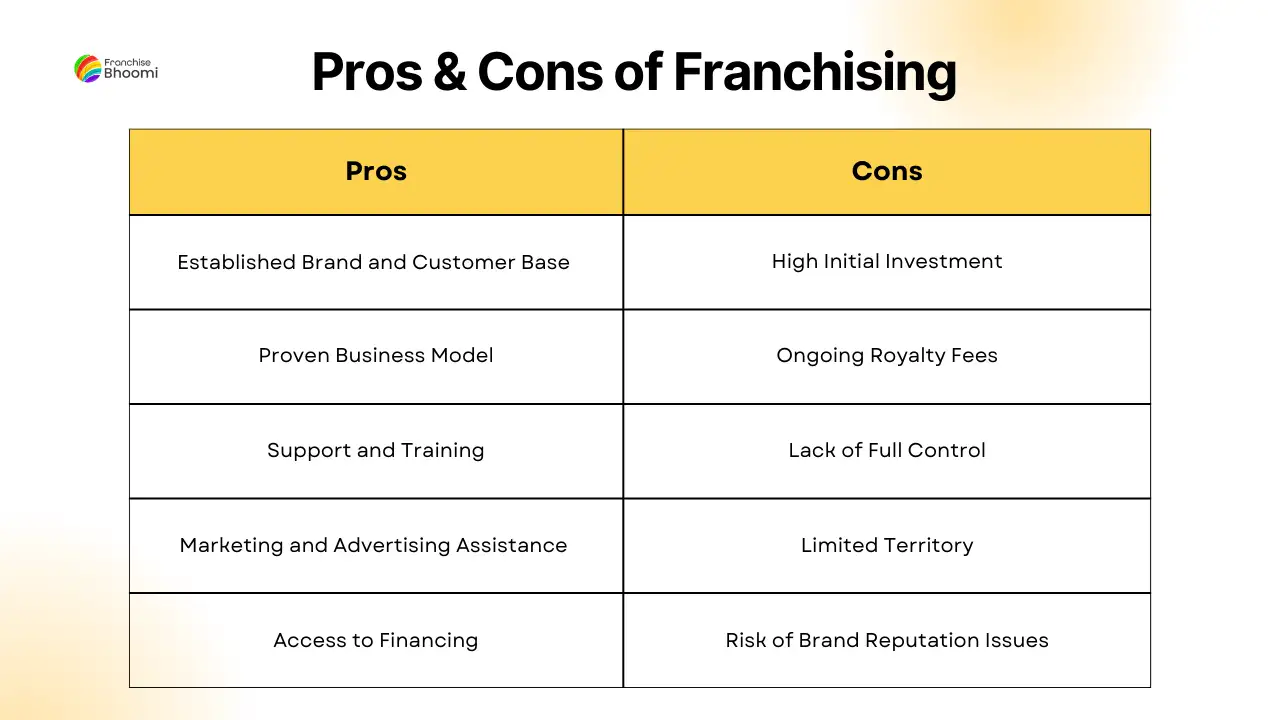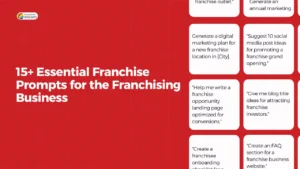Have you ever wondered if you might build a great business without starting from scratch? That’s exactly what a franchise provides: the opportunity to join an established brand with an existing client base and proven systems. But is franchising the quick path to success that it appears to be, or are there hidden hurdles beyond the surface?
Let’s break down the true perks and pitfalls of owning a franchise so you can decide if it’s the right move for you.
What is Franchise?
A franchise is a business model where an individual (called the franchisee) purchases the rights to operate a branch of an established brand (known as the franchisor). Instead of building a new business from scratch, the franchisee runs a business using the franchisor’s brand, products, and operational model.
How its Works
When you purchase a franchise, you’re buying the right to use the brand’s name, products, and systems. For example, a fast-food franchise will provide you with recipes, training, and a supply chain. In return, you must follow their rules for running the business and pay fees.
Franchising is popular because it combines the independence of small business ownership with the support of an established brand, but it does require adhering to the franchisor’s standards.
Franchise Business Market-size in India
The franchise business market is poised for substantial growth, driven by various factors including increasing consumer demand, brand recognition, and innovative marketing strategies.The franchise business in India is experiencing significant growth and is projected to reach a market size of $140-150 billion within the next five years. Currently valued at approximately Rs 800 billion, the industry is expanding at an impressive annual growth rate of 30-35%.
What is the Pros & Cons of franchise business
Here we can see the pro & cons of franchise business.
Pros of franchise business
1. Established Brand and Customer Base
Franchises come with built-in brand recognition, which significantly reduces the time and effort needed to attract customers. Consumers are often familiar with the brand, making it easier to generate sales right from the start. Purchasing a franchise means investing in a well-known company that has gradually gained the trust of its client.
Example: Opening a McDonald’s franchise means that people already trust the brand, so you can expect customers to walk in without having to start building recognition from scratch.
2. Proven Business Model
The ability to use a business plan that has previously been tried and tested and shown to work in several locations is one of the main benefits of owning a franchise. From daily operations to customer service procedures, marketing plans, and inventory management, the franchisor has created a system that covers it all. Example: A Subway franchise offers an established way of running your business, from food preparation to customer service, so you can follow a reliable system rather than experimenting on your own.
3.Support and Training
The extensive assistance and training that comes with purchasing a franchise is one of the main benefits. Franchisors are aware that a large number of franchisees can lack prior business management experience, particularly in their particular industry. Because of this, they provide comprehensive training programs that teach you all you need to know to run the business effectively.
Example: Take Dunkin’ Donuts as an example. Dunkin’ provides a comprehensive training program for new franchisees, which includes everything from store operations to customer service skills, supply chain management, and marketing.
4. Marketing and Advertising Assistance
Although marketing can be costly and time-consuming, it is crucial for the expansion of any business. For the benefit of all of their franchisees, many franchisors manage regional or national advertising campaigns. This implies that you can take advantage of high-quality ads and a wider range of marketing resources than you might be able to afford if you were launching your own independent company.
Example: With a Starbucks franchise, you benefit from global campaigns that promote their coffee and other products. You don’t have to create your own promotional content or worry about advertising costs because Starbucks invests heavily in brand marketing and national campaigns.
5. Access to Financing
One of the most difficult things about starting a new business is getting money. In contrast to independent businesses, franchises are typically seen as safer investments by banks and investors. Lenders are more likely to grant loans to franchises because they have a successful track record and a tested business plan.
Example: If you wanted to open a 7-Eleven franchise, banks are more likely to approve your loan application due to the established nature of the 7-Eleven brand. The proven track record of 7-Eleven franchises can reduce the perceived risk from the lender’s perspective, making it easier for you to secure the necessary financing.
The benefits of purchasing a franchise include a well-known brand, a tested business plan, and extensive support, all of which can lower the chance of failure. It gives franchisees the resources and tools they need to launch and operate a profitable business more rapidly.
Cons of Buying a Franchise
1.High Initial Investment
Franchises frequently demand a large initial outlay of funds, which covers the franchise fee, equipment, real estate, and other start-up costs. The initial investment is still a significant financial commitment, even though the advantages of an established brand and business plan can partially offset these expenses.
- Example: Opening a McDonald’s franchise requires a substantial initial investment. This includes a franchise fee, real estate costs, renovations, equipment, and initial stock. The total investment can easily reach several hundred thousand to over a million dollars, making it a costly endeavor for someone without access to significant funding.
2.Ongoing Royalty Fees
The majority of franchise contracts call for regular royalties, which are typically calculated as a percentage of your sales. These royalties can lower your overall profits even though they are meant to support the brand and guarantee consistent quality and marketing.
- Example: A Subway franchisee pays ongoing royalties and additional contributions for advertising and other expenses. Even with healthy sales, these costs can accumulate and reduce the overall profit margin, leaving less income for the franchisee.
3.Lack of Full Control
The rules and regulations set forth by the franchisor must be adhered to by franchisees, which may restrict their autonomy. Franchisees are required to follow the guidelines established by the franchisor in terms of pricing, menu selections, store layout, and marketing tactics. It can be discouraging for people who wish to be more creative or modify their business to suit local tastes.
- In a Dunkin’ Donuts franchise, you are required to sell specific menu items, use standardized equipment, and adhere to strict operational guidelines. If you want to add a local flavor to your menu or change the store layout, you would need to get approval from Dunkin’s corporate office, limiting your ability to customize the business.
4.Limited Territory
Franchise agreements often come with territorial restrictions, which means that you may only be allowed to operate in a specific geographic area. This could prevent you from expanding to nearby locations or competing with other franchisees in your region. In some cases, franchisors limit the number of franchises within a certain radius, so you might not be able to open additional units in the area if demand increases.
- Example: A 7-Eleven franchise has certain territorial boundaries that prevent franchisees from opening multiple locations too close to each other. If your store is performing well and there’s high demand in a nearby area, you may not be able to open a second location, reducing your potential for growth.
5.Risk of Brand Reputation Issues
As a franchisee, your business is tied to the reputation of the franchisor. If the brand faces a public scandal, quality issues, or negative publicity, your business can be negatively affected, even if your specific franchise is not involved. This lack of control over the brand’s reputation can be risky, especially if the franchisor makes poor decisions or fails to resolve issues quickly.
The cons of buying a franchise include high initial costs, ongoing royalties, and limited control over business decisions. Additionally, franchisees are at risk if the brand faces reputation issues or if territorial restrictions limit growth opportunities.
Conclusion
Owning a franchise can be a rewarding business venture, offering the benefits of a proven business model, established brand recognition, and extensive support and training. The ability to tap into a ready-made customer base and leverage corporate resources can make the path to success smoother and less risky compared to starting a business from scratch.
However, it’s important to carefully consider the challenges that come with franchise ownership. The high initial investment, ongoing fees, limited control over business decisions, territorial restrictions, and dependence on the overall brand reputation can present significant hurdles. While franchising offers a well-trodden path, it’s crucial to understand the financial commitments and operational limitations that come with this business structure.Ultimately, the decision to invest in a franchise depends on your personal goals, risk tolerance, and willingness to work within a structured system. By weighing both the pros and cons, you can make an informed decision that aligns with your entrepreneurial aspirations.
PS: Please help me improve my content, share your feedback by clicking any of the emojis below 👇
FAQ
Owning a franchise offers the benefit of an established brand and proven business model, reducing the risk typically associated with startups.
Generally, no. Franchises operate under a standardized business model. The franchisor controls branding, product offerings, pricing, and marketing to ensure consistency across all locations. Franchisees must adhere to these guidelines to maintain brand integrity.
Franchising can be easier than starting from scratch since it provides a proven business model, brand recognition, and support. However, it also comes with restrictions and fees, which means it might not suit everyone. It’s best for those who prefer established systems over full independence.





Pingback: Harsh Goenka Net Worth: How Rich Is the RPG Group Chairman?
Pingback: Abhay Firodia Net Worth: Monthly Income, Biography
Pingback: Nirmal Minda Net Worth: Monthly Income, Biography